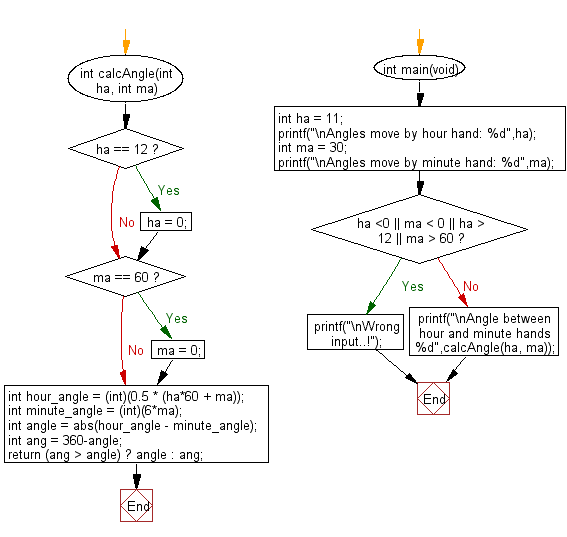C Exercises: Find angle between given hour and minute hands
C Programming Mathematics: Exercise-28 with Solution
Write a C program to find angle between given hour and minute hands.
Example:
Input: int ha = 11
int ma = 30
Output: Angle between hour and minute hands 165
Sample Solution:
C Code:
#include <stdio.h>
#include <math.h>
int calcAngle(int ha, int ma)
{
if (ha == 12)
ha = 0;
if (ma == 60)
ma = 0;
int hour_angle = (int)(0.5 * (ha*60 + ma));
int minute_angle = (int)(6*ma);
int angle = abs(hour_angle - minute_angle);
int ang = 360-angle;
return (ang > angle) ? angle : ang;
}
int main(void)
{
int ha = 11;
printf("\nAngles move by hour hand: %d",ha);
int ma = 30;
printf("\nAngles move by minute hand: %d",ma);
if (ha <0 || ma < 0 || ha > 12 || ma > 60)
{
printf("\nWrong input..!");
}
else
{
printf("\nAngle between hour and minute hands %d",calcAngle(ha, ma));
}
}
Sample Output:
Angles move by hour hand: 11 Angles move by minute hand: 30 Angle between hour and minute hands 165
Flowchart:

C Programming Code Editor:
Improve this sample solution and post your code through Disqus.
Previous: Write a C program to multiply two numbers using bitwise operators.
Next: C programming: Functiion Exercises - Home page.
What is the difficulty level of this exercise?
Test your Programming skills with w3resource's quiz.
C Programming: Tips of the Day
Static variable inside of a function in C
The scope of variable is where the variable name can be seen. Here, x is visible only inside function foo().
The lifetime of a variable is the period over which it exists. If x were defined without the keyword static, the lifetime would be from the entry into foo() to the return from foo(); so it would be re-initialized to 5 on every call.
The keyword static acts to extend the lifetime of a variable to the lifetime of the programme; e.g. initialization occurs once and once only and then the variable retains its value - whatever it has come to be - over all future calls to foo().
Ref : https://bit.ly/3fOq7XP
- New Content published on w3resource:
- HTML-CSS Practical: Exercises, Practice, Solution
- Java Regular Expression: Exercises, Practice, Solution
- Scala Programming Exercises, Practice, Solution
- Python Itertools exercises
- Python Numpy exercises
- Python GeoPy Package exercises
- Python Pandas exercises
- Python nltk exercises
- Python BeautifulSoup exercises
- Form Template
- Composer - PHP Package Manager
- PHPUnit - PHP Testing
- Laravel - PHP Framework
- Angular - JavaScript Framework
- Vue - JavaScript Framework
- Jest - JavaScript Testing Framework
